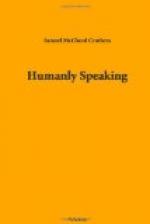“After the sons of Noah built the tower of confusion, Noah with all his sons came to Italy. And not far from the place where Rome now is they founded a city in his name, where he brought his travail and life to an end.” To come to the city of Noah was worth a long journey. Just think of actually standing on the spot where Shem, Ham, and Japhet soothed the declining years of their father! It was hard to realize it all. And it appears that Japhet, always an enterprising person, built a city of his own on the Palatine Hill. There is the Palatine, somewhat cluttered up with modern buildings of the Caesars, but essentially, in its outlines, as Japhet saw it.
But there were other pioneers to be remembered. “Saturn, being shamefully entreated by his son Jupiter,” founded a city on the Capitoline Hill. One wonders what Shem, Ham, and Japhet thought of this, and whether their sympathies were with Jupiter who was seeking to get a place in the sun.
It is hard to understand the complicated politics of the day. At any rate, a short time after, Hercules came with a band of Argives and established a rival civic centre. In the meantime, Janus had become mixed up with Roman history and was working manfully for the New Italy. On very much the same spot “Tibris, King of the Aborigines” built a city, which must be carefully distinguished from those before mentioned.
All this happened before Romulus appeared upon the scene. One with a clear and comprehensive understanding of this early history might enjoy his first morning’s walk in Rome. But to the middle-aged pilgrim from the West Riding of Yorkshire, who had come to Rome merely to see the tomb of St. Peter, it was exhausting.
But perhaps mediaeval tradition did not form a more confusing atmosphere than the sentimental admiration of a later day. In the early part of the nineteenth century a writer begins a book on Rome in this fashion: “I have ventured to hope that this work may be a guide to those who visit this wonderful city, which boasts at once the noblest remains of antiquity, and the most faultless works of art; which possesses more claims to interest than any other city; which has in every age stood foremost in the world; which has been the light of the earth in ages past, the guiding star through the long night of ignorance, the fountain of civilization to the whole Western world, and which every nation reverences as the common nurse, preceptor, and parent.”
This notion of Rome as the venerable parent of civilization, to be approached with tenderly reverential feelings, was easier to hold a hundred years ago than it is to-day. There was nothing to contradict it. One might muse on “the grandeur that was Rome,” among picturesque ruins covered with flowering weeds. But now a Rome that is obtrusively modern claims attention. And it is not merely that the modern world is here, but that our view of antiquity is modernized. We see it, not through the mists of time, but as a contemporary might.




